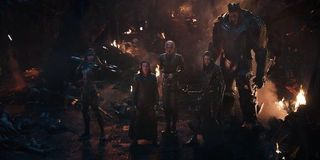The Big Way The Black Order Changed From The Comics In Avengers: Infinity War

In his lifelong quest to collect all six Infinity Stones, Thanos has some nice help from the group known as the Black Order in Avengers: Infinity War -- though comic book fans might recognize some slight changes from the source material. Specifically, all four members are toned down a bit in terms of their abilities -- allowing them to be more manageable opponents. This may seem like a strange move for a blockbuster with some seriously extreme stakes, but directors Joe and Anthony Russo recently told me why they made those choices. Said Joe Russo,
This is our interpretation of the Black Order as fits into the Marvel Cinematic Universe. They are not as all powerful as they are in the comics. We didn't want them overshadowing Thanos. They're minions who are as powerful and more powerful than Gamora and Nebula. They sort of fit into that world of orphans that have been retconned by Thanos as he destroys half the population of planets, going around conquering planets around the universe.
As the Marvel Cinematic Universe has grown, filmmakers have understood the need to divert from the source material in certain ways, and the creation of the live-action Black Order is one perfect example. I had the pleasure of talking about the group with Joe and Anthony Russo during the Los Angeles press junket for Avengers: Infinity War last month, and it was during that conversation I learned about their logical approach -- not wanting to make the Children of Thanos as significant a threat as their leader, as a means of making the Mad Titan stand out more as a specific threat.
The Black Order was a group created by Jonathan Hickman, Jerome Opeña and Jim Cheung during the 2013 Infinity crossover event, introducing Marvel fans to the Infinity Stone-collecting unit including Corvus Glaive, Proxima Midnight, Ebony Maw and Black Dwarf. In Avengers: Infinity War they put up an extremely tough fight against the Avengers and the Guardians of the Galaxy, and definitely represent serious opponents to the heroes, but nothing quite on the level of Thanos. And obviously this makes plenty of sense, as while they are meant to be threats, they are also supposed to just be stepping stones up to the big bad.
It's also worth noting that the third Avengers film doesn't spend a great deal of time explaining who the Black Order is -- but there's a good reason for that too: there just isn't a whole lot of time in the narrative. When I specifically asked about Corvus Glaive's glaive and how it's presented in the comics (it makes him immortal unless it's broken), Joe Russo explained,
It's powerful, you'll see its power in the film, but we couldn't get into it two and a half hours - with 23 heroes on the poster. It wasn't a priority for us to get into the backstory of the Black Order. You get tidbits about them as you watch the film, and there's some implied relationships between some of those characters, but nothing that would detract from story real estate.
When all is said and done, the Black Order isn't the most well-defined group of characters in the Marvel Cinematic Universe, but at the same time they certainly do add a lot to the crazy pressure facing the heroes in Avengers: Infinity War. Fans can now go see the film in theaters everywhere, and be sure to stay tuned here on CinemaBlend for a whole lot more of our coverage.
CINEMABLEND NEWSLETTER
Your Daily Blend of Entertainment News

Eric Eisenberg is the Assistant Managing Editor at CinemaBlend. After graduating Boston University and earning a bachelor’s degree in journalism, he took a part-time job as a staff writer for CinemaBlend, and after six months was offered the opportunity to move to Los Angeles and take on a newly created West Coast Editor position. Over a decade later, he's continuing to advance his interests and expertise. In addition to conducting filmmaker interviews and contributing to the news and feature content of the site, Eric also oversees the Movie Reviews section, writes the the weekend box office report (published Sundays), and is the site's resident Stephen King expert. He has two King-related columns.
Most Popular





